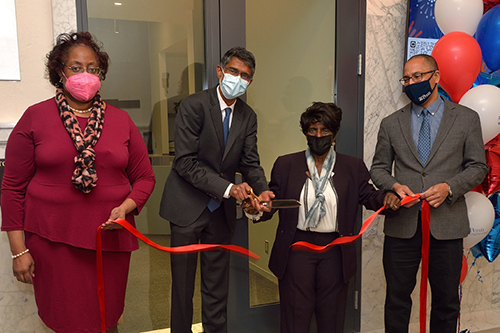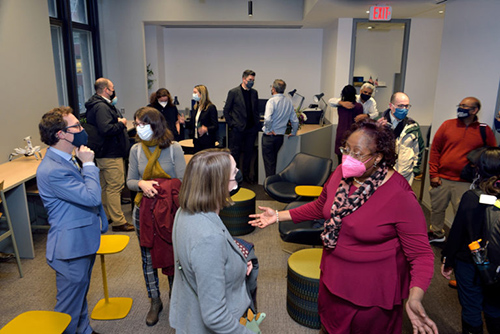Penn Medicine: Medical Miracles on 34th Street
After Penn Medicine’s First Living Donor Uterus Transplant, Donor Meets Baby Carried in Her Transplanted Womb
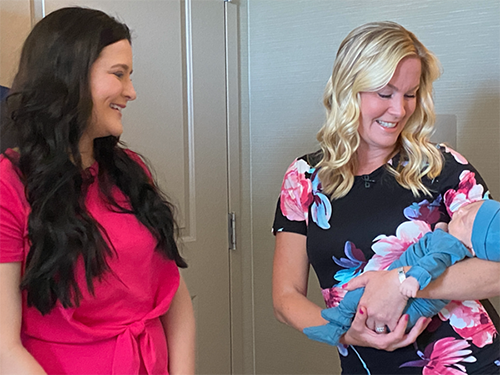
As proud new mom Chelsea Jovanovich tenderly placed her newborn son into Cheryl Cichonski-Urban’s arms, the two women marveled at baby Telden’s angelic features, sweet disposition, and one other remarkable detail that two moms don’t typically share: The uterus where Telden spent months growing inside Ms. Jovanovich’s body is the same uterus that brought Ms. Urban’s children into the world about a decade before. It was a profound moment that marked a special bond between the two prior strangers involved in Penn Medicine’s first-ever living donor uterus donation.
After having her own two kids, Ms. Urban, who is from Bucks County, Pennsylvania, never gave too much thought to her uterus again until one day in June of 2019 when she said she saw a story about uterus donation on the local news. “When I heard [this donor’s] story, I was blown away. I needed to find out more,” Ms. Urban said. “Whether it be faith, stars aligning or whatnot, something drew me to this story. I felt it in my heart that this was something I was meant to do.”
She was so inspired by the story, she decided right then and there she wanted to donate her own uterus. With the support of her daughter, son, and her husband, Brian, Ms. Urban signed up online for Penn Medicine’s Uterus Donation program the very next day.
More than 2,000 miles away in Billings, Montana, Ms. Jovanovich was also looking at the Penn Medicine Uterus donation website. After years of heartbreaking fertility news, she was hoping to be accepted as a recipient.
What these women didn’t know at the time was they would go on to be linked forever by a selfless gift that would allow Ms. Jovanovich and her husband to have the baby they had long hoped for. When she was 15, Ms. Jovanovich learned from her doctor that she had Mayer-Rokitansky-Küster-Hauser (MRKH) Syndrome, a congenital disorder in which women are born without a uterus. Women with the condition suffer from Uterine Factor Infertility (UFI), a previously irreversible form of female infertility that affects as many as five percent of reproductive-aged women worldwide. A person with UFI cannot carry a pregnancy either because she was born without a uterus, like Ms. Jovanovich, or had the organ removed for medical reasons. Individuals may also have UFI because they have a uterus, but pregnancy is not possible due to fibroids, scar tissue, or other conditions.
“It was a lot harder on me emotionally as I got into my child-bearing years,” Ms. Jovanovich said, recalling the devastating diagnosis. “Your friends are having babies, and you can’t. It was pretty hard and I went through some rough patches.”
She and her husband Jake had even gone down the surrogacy route, only for it to not work out at the last moment. Feeling out of options, Ms. Jovanovich learned about uterus donation from her doctor and searched programs online, but it felt like a moonshot.
“Even though I felt like this was something completely out of reach for me, I applied anyway. I never thought I’d be accepted,” she said.
As it turns out, Ms. Jovanovich was accepted into the program, and Ms. Urban was accepted as a donor. After rigorous testing, Ms. Urban found out there was a patient waiting for a uterus, and that she was an exact match. She went ahead with the donation having no idea who the recipient was, with the surgeries taking place in February of 2020, right before the world shut down due to the COVID-19 pandemic.
Kathleen E. O’Neill, an assistant professor of obstetrics and co-principal investigator of Penn Medicine’s Uterus Transplantation for Uterine Factor Infertility (UNTIL) trial, worked with the Ms. Jovanovich’s throughout the whole process.
“Women with UFI have limited pathways to parenthood. My goal was to provide women with UFI an additional option in uterus transplant. Moreover, uterus transplant is the only option that allows women with UFI the opportunity to carry and deliver their own babies. Once the participant heals from their surgery, a single embryo is placed into the uterus. If the participant becomes pregnant, she is monitored closely by a team of obstetricians who specialize in high-risk pregnancies. This program is a team effort and success required over 100 people from seemingly every part of Penn Medicine,” Dr. O’Neill said.
For this case, Dr. O’Neill worked closely with Nawar Latif, surgical director of the Living Donor Uterus Transplant Program and co-principal investigator of the Uterus Transplant trial, who performed this first-of-its-kind of surgery at Penn Medicine to remove Ms. Urban’s uterus, providing her with intensive recovery care in the weeks that followed.
“It was a huge milestone for me personally and for Penn Medicine. That moment was a culmination of countless hours of preparation and training. The feeling of responsibility towards the donor, recipient, and the entire program was tremendous. I felt anxious, but confident that the transplant process would be successful. Being one of two gynecologic oncologists in the country who perform this kind of surgery is very special!” Dr. Latif said.
Paige Porrett, who has since joined the faculty at the University of Alabama at Birmingham as the director of VCA Transplantation and the director of clinical and translational research at the UAB Comprehensive Transplant Institute, performed the uterus transplant on Ms. Jovanovich, together with Kim M. Olthoff, the chief of transplant surgery and Donald Guthrie Professor in Surgery.
A living donor uterus transplant is still a very rare surgery, with only 20 having been performed in the United States as of April 2021. Dr. Latif used a minimally invasive robotic approach, after observing similar surgeries performed in other countries and cities, and undergoing multiple training and rehearsal sessions ahead of time.
Dr. Latif had performed dozens of robotic radical hysterectomies before (a surgery to remove the uterus, cervix, and part of the vagina), but to perform the living donor surgery, he had to deconstruct and rebuild the entire approach to this kind of hysterectomy and to map the entire vascular anatomy of the donor.
“Cheryl is the ultimate, most altruistic person I have ever met. Her interest to help others and advance science was a clear drive for her,” he said. “She never wavered during the long process of planning, surgery and healing, she’s a super woman.”
Ms. Urban said meeting with the doctors reinforced her decision. “Once I met Dr. O’Neill and Dr. Latif, they totally gained my trust and I 100 percent put my faith in them.”
After the successful surgery, Ms. Jovanovich and her husband stayed in Philadelphia for the next step in their journey. They learned the embryo had successfully implanted, and with a little help from science, were officially pregnant.
Almost a year after the transplant, with a baby boy on the way, Ms. Jovanovich reached out to Ms. Urban through their social workers to thank her for her gift. Since that day, the two began talking more regularly—Ms. Urban joined the Jovanoviches at their virtual gender reveal and baby shower, and the two women met in person for the first time in May of 2021.
“She and I went from communicating through our social workers, to sending emails, to trading cell numbers. It’s amazing how we click. Two strangers who instantly became soul sisters,” Ms. Urban said.
On May 18, 2021, Ms. Jovanovich gave birth to a healthy baby boy, the child she and her husband had dreamed about, and the first grandchild on her side of the family. A few weeks later, Ms. Urban and her husband, Brian, arrived to meet the Jovanovich family for a very emotional reunion, and to see baby Telden for the first time.
“Thank you for, everything,” Ms. Jovanovich said through tears as she hugged the couple.
Despite the discomfort that comes with major surgery, it’s been a journey Ms. Urban said fondly.
“It’s been like a fairytale,” she said. “It’s so unbelievable. I sit, think about it, and I can’t believe it happened. I can’t believe it worked.”
Penn’s First COVID-19 Lung Transplant Patient Recovered to Celebrate His Triplets’ High School Graduation
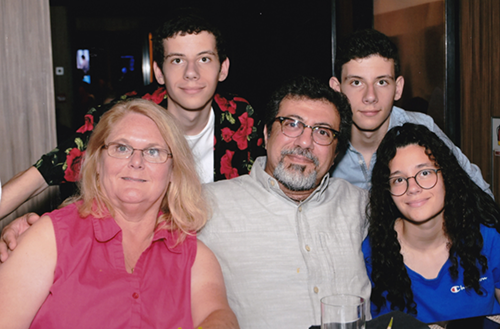
On some of the worst days of his battle with COVID-19, Fred Rahmanian remembers waking up in his hospital bed to look at photos of his wife and three kids that someone had lovingly taped to the wall in his room. Mr. Rahmanian was one of millions of Americans sickened by COVID-19, but when he first went into the hospital in October of 2020, it didn’t cross his mind that he might be the first patient with COVID-19 to receive a lung transplant at Penn Medicine, and the first in the state, months later.
In October, Mr. Rahmanian, a 54-year-old husband and father of teenage triplets, was one of four people in his family to test positive for COVID-19. While his kids recovered quickly, he found himself in an ambulance on the way to his local hospital in Reading, PA, where he continued to feel worse and wasn’t responding to treatment.
His condition continued to deteriorate, and late on November 11 he rapidly became so sick that doctors deemed him too unstable to even transport to a tertiary center for more advanced care. That’s when his local hospital called for assistance from Penn’s Lung Rescue Mobile ECMO team, kicking off a long chain of Penn Medicine care that would see Mr. Rahmanian through to a remarkable recovery.
Penn’s Mobile ECMO team usually travels by helicopter to quickly pick up very sick patients. The Extracorporeal Membrane Oxygenation (ECMO) machine provides functions normally performed by the patients’ own heart, lungs, or both. It withdraws unoxygenated blood from the patient, oxygenates it, and pumps it back into the body—this oxygenation process removes carbon dioxide and replaces oxygen just as healthy lungs would. There was one complication though, on that particular night; a storm raging outside made flight conditions impossible. So the team pivoted. William Vernick, co-medical director of the Penn Lung Rescue, Asad Usman, a Penn anesthesiology and critical care fellow, along with the PennSTAR Team, physically went to pick Mr. Rahmanian up and take him to Penn by ambulance, hooking him up to the ECMO machine for the trip.
“Even though it was late at night, I remember the drive quite vividly. The rain was so heavy that I couldn’t go more than 30 mph on the highway. It made for an extremely long drive, but seeing him do well definitely made it worth it,” said Dr. Vernick.
Once at Penn, and after a few weeks on ECMO, Mr. Rahmanian was still alive, but it was clear to the medical team that Mr. Rahmanian’s lungs were not getting better. Maria M. Crespo, medical director of the Penn Lung Transplant Program, helped care for Mr. Rahmanian during this most critical time. His care team knew he had one option left to save his life: transplant. No one at Penn Medicine had ever performed a lung transplant on a patient with COVID-19. In fact, it was almost unheard of at that point in the global medical community.
“Fred’s case was unique because although his lungs were severely injured by the virus, he was otherwise a healthy man. We were confident that with the care he would receive at Penn, he had a good chance of recovery, so we all worked together to make sure we got every detail right,” Dr. Crespo said.
Hearing that is when Mr. Rahmanian said the gravity of the situation really set in. “When I realized what they were asking me, that’s when it dawned on me, this is the last of the options. Otherwise this is it for me. My family had already resolved with the fact that that this was probably it if I don’t decide to do the transplant,” he said, recalling what went through his mind. “I want to see my kids’ graduation, I want to see them turn 18, I want to see them go to college. There’s so many things that we haven’t done yet.”
The Transplant Infectious Diseases Program at Penn Medicine has been in operation for decades, providing comprehensive care for the evaluation and management of infectious diseases for patients before and after transplant. This last year they played an especially critical role with the COVID-19 pandemic, as transplants were still critical to saving lives of patients with various illnesses. Sarah Longworth, assistant director of the Transplant Infectious Disease Program, cared for Mr. Rahmanian during his treatment.
“As with any patient being considered for transplant, we want to make sure that recent infections are at minimum controlled, and at best fully resolved. This is true for COVID-19 as well, particularly in patients like Fred in whom this infection was the cause of his organ failure,” Dr. Longworth said. “Since Fred was the first patient we transplanted for COVID-related lung disease, we were in uncharted waters with no clearly defined standard of care. He was tested multiple times for COVID-19 to ensure the infection had cleared before we proceeded to transplant, in order to minimize risk of re-infection of his new lungs.”
Qualifying to be a transplant patient is complex under normal circumstances, but here doctors were dealing with those complexities on top of a patient who was critically ill with COVID-19, a virus that the medical community was still learning about with a constant flow of new discoveries. This translated to a new list of criteria for Penn Medicine patients to meet before being placed on the transplant list.
Not every ECMO patient with COVID-19 can be considered transplant candidates. For example, to qualify, candidates have to be under 60 years old if they’re on a ventilator or ECMO, can’t have more than one organ failing, and must have a BMI less than or equal to 35, along with additional guidelines. These specific lung transplant guidelines for COVID-19 related lung injuries were developed and issued by Dr. Crespo, Joshua Diamond, associate medical director of the Penn Lung Transplant Program, and Christian Bermudez, director of thoracic transplantation at the Penn Transplant Institute.
“Currently the stakes are high for lung transplants. First, there’s the absence of enough organ donation to meet the need for lung transplants in the U.S. Further, there’s the impact of patients who have been on prolonged ECMO support before they can become transplant candidates – for those patients, surgery can carry a high risk,” said Dr. Bermudez, who performed the surgery.
Within 72 hours of being listed for transplant, doctors found Mr. Rahmanian a perfect donor match. On December 31, 2020, Dr. Bermudez and his team went into the operating room for what would be more than six hours of surgery. Just after 5:15 a.m. on New Year’s Day, Mr. Rahmanian woke up with a new set of lungs and a new chance to live. When he woke up, he took some of the easiest breaths he’d taken in months, and learned some additional news.
“I was told, you made history, you’re the first one in Pennsylvania!” he said. “This whole thing has been a miracle. Everyone knew I was at the end of the line. There was no expectation that I would live until Penn stepped in.”
Usually transplant patients take six to eight weeks to recover in the ICU, but after just 20 days Mr. Rahmanian was taken to Good Shepherd Rehabilitation Center, where he continued his recovery.
“With an incredible mental and physical strength Fred was able to overcome adversity with the help of the ICU nurses, doctors, and physical therapists, and was in optimal condition for transplant after more than seven weeks of ECMO support. This hard work fortunately paid off as he had a swift recovery leaving the hospital only 20 days following his lung transplant,” Dr. Bermudez said.
On February 24, 2021, Mr. Rahmanian spent the first night in his own bed since October 27, 2020. At the time of the surgery, fewer than eight lung transplant centers nationwide were performing lung transplants in COVID-19 patients with acute lung injury. As of March, Penn was one of 28 hospitals in the United States that had performed heart or lung transplants for patients with COVID-19 according to the United Network for Organ Sharing.
“At Penn I felt very comfortable that I was being taken care of. Everyone that I interacted with was very helpful, very sympathetic. They essentially granted me a miracle by choosing to do this for me.”
Mr. Rahmanian said that from the moment he agreed to the transplant, his driving force to recover was his family and return to some sense of normalcy. Recently, he did get to watch his triplets turn 18 and graduate from high school.“I was grateful that I was given more time,” he said.
Articles adapted from Penn Medicine News.

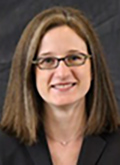 Senior Executive Vice President Craig Carnaroli announced the appointment of Kathleen Shields Anderson as the Interim Vice President for Public Safety effective January 1, 2022. Mr. Carnaroli previously announced the retirement of Maureen S. Rush, following 27 years of dedicated service to the University, including 20 years as Vice President for Public Safety.
Senior Executive Vice President Craig Carnaroli announced the appointment of Kathleen Shields Anderson as the Interim Vice President for Public Safety effective January 1, 2022. Mr. Carnaroli previously announced the retirement of Maureen S. Rush, following 27 years of dedicated service to the University, including 20 years as Vice President for Public Safety.
 Two Penn Integrates Knowledge Professors, Konrad Kording and George Demiris, have received named University Professorships. The announcement was made on December 6 by President Amy Gutmann.
Two Penn Integrates Knowledge Professors, Konrad Kording and George Demiris, have received named University Professorships. The announcement was made on December 6 by President Amy Gutmann. Horst S. Daemmrich, emeritus professor and former chair of the department of Germanic languages and literatures, died November 26 at his home in Flourtown, PA. He was 91.
Horst S. Daemmrich, emeritus professor and former chair of the department of Germanic languages and literatures, died November 26 at his home in Flourtown, PA. He was 91. James McGann, senior lecturer of international studies at the Lauder Institute, director of the Think Tanks and Civil Societies Program, and senior fellow at the Fels Institute of Government, died on November 29. He was 66.
James McGann, senior lecturer of international studies at the Lauder Institute, director of the Think Tanks and Civil Societies Program, and senior fellow at the Fels Institute of Government, died on November 29. He was 66.
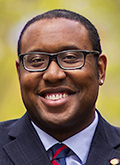
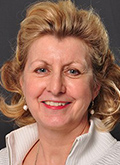 Three faculty from the University of Pennsylvania, Holly Fernandez Lynch, Perelman School of Medicine; Quayshawn Spencer, School of Arts & Sciences; and, Connie Ulrich, School of Nursing, have been named Hastings Center Fellows for deepening public understanding of complex ethical issues in health, health care, science, and technology.
Three faculty from the University of Pennsylvania, Holly Fernandez Lynch, Perelman School of Medicine; Quayshawn Spencer, School of Arts & Sciences; and, Connie Ulrich, School of Nursing, have been named Hastings Center Fellows for deepening public understanding of complex ethical issues in health, health care, science, and technology.

